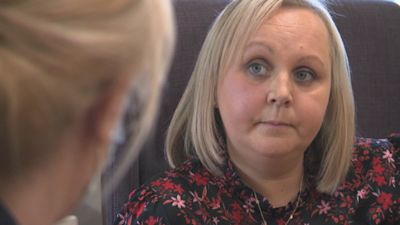'It's a wonderful place': How Northumbria's palliative care is helping patients to live with cancer

Hearing palliative care described as 'wonderful' may come as a surprise to some, but it is exactly how Sarah Harrison sees it.
In fact, she says it has been a lifeline, as she has learned to live with incurable cancer.
Sarah received months of concentrated care after she discovered her breast cancer had returned and spread elsewhere in her body. She was visited at home by a palliative care nurse and together, they worked on reducing Sarah's intense pain though she and her family have also been supported in other ways too.
"When people mention palliative care, you get a real shock and you think death and dying straight away" she explains.
"But the reality of it is, a lovely person comes to your home and tries to help you and your family cope with an impossible situation."
Sarah says that with the support of her palliative care nurse, she was able to regain her life and while there are still challenges, she is able - as she puts it - to 'make the best of what I've got.'
Sarah is one of the hundreds of people supported by the palliative care service which covers Northumberland and North Tyneside.
The programme is unique because, rather than being hospice-led, it is run by Northumbria Healthcare NHS Foundation Trust.
Some patients who receive palliative care will be cured, though the majority will live with their condition and may see their lives shortened as a result.
For consultant Dr Paul Paes, a key part of the team's work is helping people to cope with the effects of their illness; not only in terms of pain and sickness but emotionally and even spiritually.
"When people have that life-threatening condition, it suddenly is a huge shock to them, it suddenly closes horizons off, so our job is to try to give them a bit of control back in their lives."
Alongside support in the community, the service cares for up to forty inpatients, across North Tyneside and Wansbeck General Hospitals.
The majority of those admitted to the units have conditions such as cancers, heart or lung disease. Over the past two years, the service has also treated patients with COVID, particularly in the early stages of the pandemic.
While this period has brought challenges, Dr Paes believes it has also underlined the value of the team's work.
"Families in different parts of the country are not able to come and be with their loved ones, so actually having an inpatient unit where people can come and their families are reassured that they're being looked after is incredibly important."
That reassurance is also on display in the day room, where patients who are treated in the community arrive for a craft session.
For lead community nurse Pam Ransom, activities like this are vital, allowing patients to escape the rigours of treatment and helping them to live as normal a life as possible.
"Patients who are palliative don't want to talk about their illness and shouldn't need to talk about their illness. Palliative care can often last for years so it's important that the right care is given at the right time for that patient."